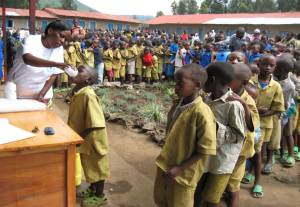By Professor Alan Fenwick OBE, Director of SCI (Schistosomiasis Control Initiative), Imperial College, London)

Schistosomiasis is a type of infection caused by parasites that live in fresh water, such as rivers or lakes, in subtropical and tropical regions worldwide. It is also known as bilharzia.
The Schistosomiasis Control Initiative (SCI) at Imperial College London supports Ministries of Health and Education in 16 countries to deliver medicines to treat people infected with schistosomiasis and three intestinal worms. The medicines are donated by various pharmaceutical companies, Merck KgGA (praziquantel), GSK (albendazle) and Johnson and Johnson (mebendazole), and for the most part, the targets are school aged children.

The SCI’s role includes advocacy at all levels in the countries from Ministers down through regional officials to teachers and health staff who deliver the medicines. These medicines are safe to swallow and effective. For the most part they are delivered annually through schools or through communities. We assist the countries with mapping so that the geographical distribution of the diseases is known, and then with preparing medicine donation requests.
We have just finished mapping Ethiopia where over 3,500 schools were visited and children were tested, and in Burundi and Rwanda where 350 schools in each country were visited and children tested. We assist with transportation of the medicines, training of teachers where necessary, and collection of baseline data and follow up data to allow us to report back to donors on the success of the campaigns in each country.
During 2013, we passed the milestone of having delivered over 100 million treatments against schistosomiasis since 2003, and with funding from DFID we are committed to supporting the delivery of another 200 million treatments by 2018.

So with DFID funding available, why do we need to expand coverage and what does that mean in terms of funding? Well, the Merck KgGA donation of praziquantel against schistosomiasis has been increased – from 20 million tablets per year in 2008 to 120 million tablets in 2015 and 250 million tablets annually from 2016. 250 million tablets of praziquantel are enough to treat 100 million children. To date, in our best year, we have treated 30 million and so expansion is essential. For the first time, the availability of donated medicines will exceed the funding available to deliver them. We reckon it costs us 50 pence per child to effectively run a programme in sub Saharan Africa and so a staggering £50 million is going to be needed per year from 2016 to 2020. There are some funds already available from DFID and USAID, but for SCI to ensure that these medicines are not wasted, we believe that we will need to raise an additional £2 million this year and £10 million subsequently.

But if we can deliver these medicines, imagine the effect on the health of the children in Africa. They are currently ravaged by parasitic infections which cause stunting, malnutrition, and liver and bladder diseases. For just an extra £10 million per year, we will improve the health of 100 million school aged children, improve their quality of life, education and prospects of growing into healthy adults.
Greetings from Zambia.
We write to inquire into your evaluation and consideration of a partnering with our organisation Lakeshore Hope and Relief Zambia in the fight against bilharzia.As an organisation dealing with programs in child health that is, nutrition and disease control in the gwembe valley of the zambezi river where sanitation facilities and other health services are inaccessible.We would be happy to be considered on your project to reach our to more than 200 million children.Currently we are implementing a Vitamin A supplement project targeting 7,000 children by 2015.Our field experience in dealing with child health and nutrition would offer a great opportunity for you to reach out to more children.
Should need further information about our works,kindly contact the undersigned.
Thank you for taking time to read this mail.
Looking forward to discussion this request with you soon
Dear Jones Shamalambo,
Thank you for your comment. I am sorry that we haven’t heard of this organisation, but am pleased to hear of your ambitions in Zambia. In the case of SCI’s work in Zambia, we are established there, and believe that we shall reach our targeted number of children using the field experience and expertise of our already existing partners which are the Ministry of Health and the Ministry of Community Development Mother and Child Health.
In particular in the Gwembe district (where our surveys suggest a 26.4% SCH prevalence) we have targeted to treat all 16,000 School Aged Children this year in September/October, and so this should include the children included in your project area (targeting over 7000). So basically we have got that district covered for schistosomiasis (bilharzia) but we thank you for expressing interest to helping us reach out to more children in your district. Should we perhaps be thinking of combining vitamin A distribution with deworming and bilharzia drug distribution ?
Perhaps if you would like to get more information, or receive local experience/recommendations on reaching out to even more children through your organisation, we would be happy to direct you to the respective Ministries that we are working with in the country.
Alan Fenwick
Thank you very much for comprehensively elaborating on your works.It is also encouraging that you have covered our area as this is the shared goal.
Thanking and looking forward to future colaboration